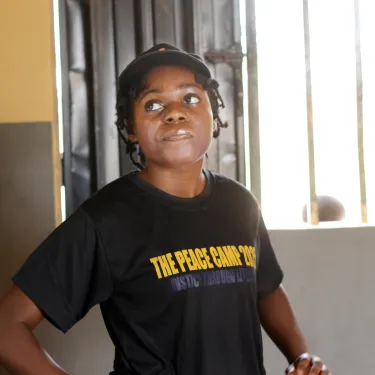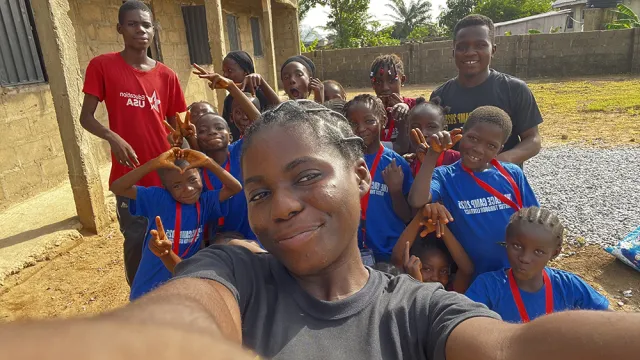Olohi Goodness John ’27
Smithie Snapshots

What inspired you to start Justice through Literacy?
Justice through Literacy was born from my experience during a gap year in 2021. After graduating high school, I began volunteering with friends to teach math and English to children at my church. It quickly became clear that while some children had access to structured schooling, many did not—and this divide fell sharply along lines of income and family background. Seeing bright, eager learners leave our lessons without the means to continue their education deeply unsettled me. I realized that access, not ability, was holding these children back. I didn’t just want to teach—I wanted to create long-term support for children to stay in school and thrive. That’s how Justice through Literacy was founded: to bridge this gap and empower children with the education they deserve.
How do you envision The Peace Camp influencing long-term educational attitudes in Kwali?
The Peace Camp was a 6-week summer program where 20 children in Kwali engaged in reading, writing, quantitative reasoning, and basic programming. From our curriculum to our parent engagement sessions, the camp was designed not just to teach, but to transform how families perceive education. One child said, “I love the Peace Camp. I love how I’m treated here”—a reflection of how the camp made students feel valued and seen, regardless of their backgrounds. Our hope is that The Peace Camp, and future Justice through Literacy programs like it, will help shift education in Kwali from being seen as merely a cultural expectation to something recognized as a meaningful, holistic investment—one that nurtures a child’s intellect, self-worth, and long-term potential. As we expand into other communities across Nigeria, we aim to foster a mindset where education is pursued not out of obligation, but out of belief in its transformative power.

Can you tell us about a moment that sparked your passion for educational equity?
“No girl can perform better than me.” Those were the words of Ibukun, a male classmate in 7th grade, during a heated class debate about who would finish top of the class. His comment stuck with me—and became a defining moment that ignited my passion for educational equity. Educational equity isn’t just about access to learning opportunities; it’s also about challenging harmful stereotypes and rebuilding the self-worth of those affected by them. I grew up to be the girl who disproved the gendered claims—the female student who defied expectations and graduated at the top of her class, year after year. That experience shaped my commitment to advancing educational equity—not only for those held back by gendered beliefs, but also for children marginalized by poverty or circumstance, as the two are highly intertwined. Everyone deserves the chance to rise beyond the limitations others place on them.
Why is the mission of The Peace Camp personally meaningful to you?
JTL's mission is to promote access to education for children in Nigerian rural communities through foundational camps, full scholarships, and continuous mentorship, hence contributing to a Nigeria where all children can learn regardless of socioeconomic background.” Growing up, I witnessed my parents struggle to pay school fees for me and my siblings. We weren’t wealthy, but because my parents were educated, they understood the value of learning and were willing to sacrifice everything to ensure we had that same opportunity. Their determination is the reason I received an education despite financial hardship. I believe every child, regardless of their socioeconomic background, deserves that same chance—to learn, to dream, and to rise. The Peace Camp represents that belief in action.
How has your experience at Smith College influenced your leadership or vision for this Project?
When I arrived at Smith College, I carried with me a dream—to promote access to education for rural children in Nigeria. That dream found structure and strength through my time at Smith. Being accepted into the Conway Center’s entrepreneurial program was a turning point. There, I was challenged to refine my vision, dig deeper into the roots of the socioeconomic divide in Nigeria, and develop tangible solutions. The program equipped me with practical skills—pitching ideas, applying for grants, and building out a sustainable model—that helped bring my dream closer to reality. So when I received the $10,000 Projects for Peace award, I didn’t just feel excited—I felt prepared. With the support and training I received at Smith, I was ready to launch JTL through The Peace Camp in summer 2025.